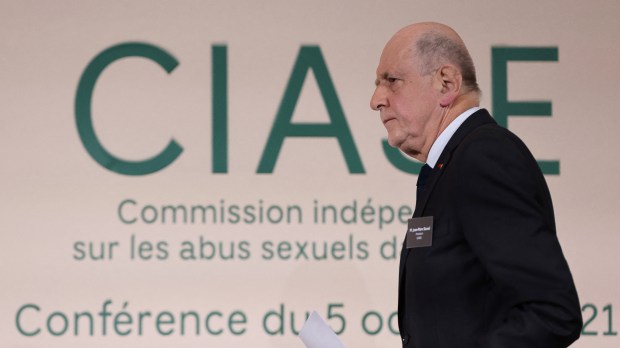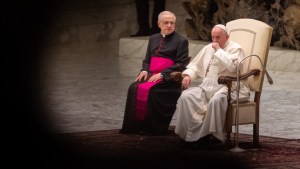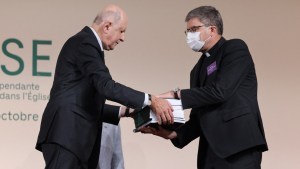After three years of investigation, the Independent Commission on Sexual Abuse in the Church in France (CIASE) issued a report on October 5 which estimates that 216,000 people have been abused by clerics or religious since 1950 in France.
I.MEDIA interviewed Jean-Marc Sauvé, the president of CIASE, on the relationship between the Church in France and the Holy See in the fight against sexual abuse.
Do you plan to come to Rome to present your report to Pope Francis?
Sauvé: It is a possibility that is on the table. We are at the disposal of the Holy Father to meet with him. We will see what the Holy See can do. It is possible that there will be a trip to Rome within a timeframe that is not determined at this stage.
At the conference to present the report, one victim said they felt that Pope Francis has been “absent” on issues of abuse. In your opinion, has Pope Francis grasped the enormity of this crisis in the Church?
Sauvé: My feeling is that Pope Francis has said and done some important things in the fight against sexual abuse in the Church. I’m thinking in particular of the Letter to the People of God of August 2018 and the meeting he organized in February 2019 with the presidents of the bishops’ conferences of the world. There are other examples, such as the reform of canon law that goes into effect on December 8, which is the culmination of a long effort.
Among the members of the commission I chaired, there is no doubt about the Holy See’s willingness to tackle this problem and Pope Francis’ commitment to these issues. It’s a continuation of the pontificate of Benedict XVI who took many steps in this direction.
We must understand the fact that the victims express a great deal of radicalism and a form of impatience that can lead them to make accusations that I, for one, do not share.
You have pointed out the blindness of Church leaders in France until the early 2000s concerning sexual abuse. Was this passivity due to a lack of decisiveness on the part of Rome?
Sauvé: I think so. Until the early 2000s, the Holy See was not extremely attentive to these issues. The first measures appeared in 2001 under the pontificate of John Paul II. A changeover took place with the new century. In France, it was at that time that we noticed a greater sensitivity on these questions.
But you can observe that civil institutions also evolved at this time. In France, it was only in 1998 that the Ministry of Education decided to move to zero tolerance. The two shifts therefore took place in the same time frame. The problem is that the “changeover” at the National Education Ministry was done rather quickly, without any qualms, (whereas) in the Church, things were done with much more difficulty, which led to a delay in implementing the procedures to fight against the abuse of minors.
Among the recommendations you make to the Church in France, there is that of the reform of Canon Law. But this applies to the universal Church. Will you ask the Pope to take this recommendation into consideration?
Sauvé: We are well aware that a reform of Canon Law is a decision which belongs to the Pope and which has a universal scope. For this type of recommendation, we are well aware that the French Bishops’ Conference cannot do anything. It’s the responsibility of the Pope and the Holy See. As I said, the reform of canon law that comes into force on December 8 is a step in the right direction.
On the commission I chair, there are a number of jurists. I myself was the vice-president of the Council of State of France. We are sensitive to the fact that today the procedure before the canonical courts in penal matters is not a fair procedure. In the sense of the European Convention on Human Rights, for example, it is not. It would seem extremely useful for the Church if this procedure were reformed.
The simple fact that an inter-diocesan criminal tribunal is being created will help to solve many problems. It is also a step in the right direction.
On the question of canon law, I would like to raise a very important point: that of victims’ access to the procedure. On the commission, we were all extremely shocked by this, especially when we looked at the situation of women, nuns, who have made complaints in the Church. The processes took place without them being heard. At the end, they were stunned to learn that the procedure was over, that a sentence had been pronounced and that they were not even informed of it.
On these issues, I am ready to do whatever it takes in terms of convictions to say that we must move on this.
At the initiative of Pope Francis, all the dioceses of the world are beginning this Sunday a vast synodal process on the theme of synodality. For you, who have chaired CIASE and who are Catholic, is this the moment to take advantage of this synod to put the question of the crisis of abuse in the Church on the table and to seek to remedy it?
Sauvé: The Commission believes that the governance of the Catholic Church would benefit from an overhaul, from the top down. Among the orientations that we believe would be useful and a priority is the search for a better articulation between the vertical and horizontal dimensions, that is, between the hierarchy and synodality.
We believe that more consultation would better protect the Catholic Church and allow it to respond in a more effective and relevant way to the problem of abuse.
When a decision is made alone, there is a greater risk of making a mistake than when the decision is made collegially. This applies to all aspects of government. Within the commission, if I make decisions alone, it’s quick and convenient. If we discuss it, we make more informed decisions.
We believe therefore that the development of synodality and the association of lay men and women with decision-making power in the Church is one response among others for a more appropriate treatment of sexual violence.
To give you an example, we discovered while working on the archives of the Catholic Church that, in the 1990s, there was an underground effort of planting seeds of change that took place. We realized that it was women who thought about these issues, who asked the right questions and who pushed the bishops to act.
The presence of enlightened people who feel things that men, for example, don’t feel, and involving them in the decision-making process, makes for better decisions.



